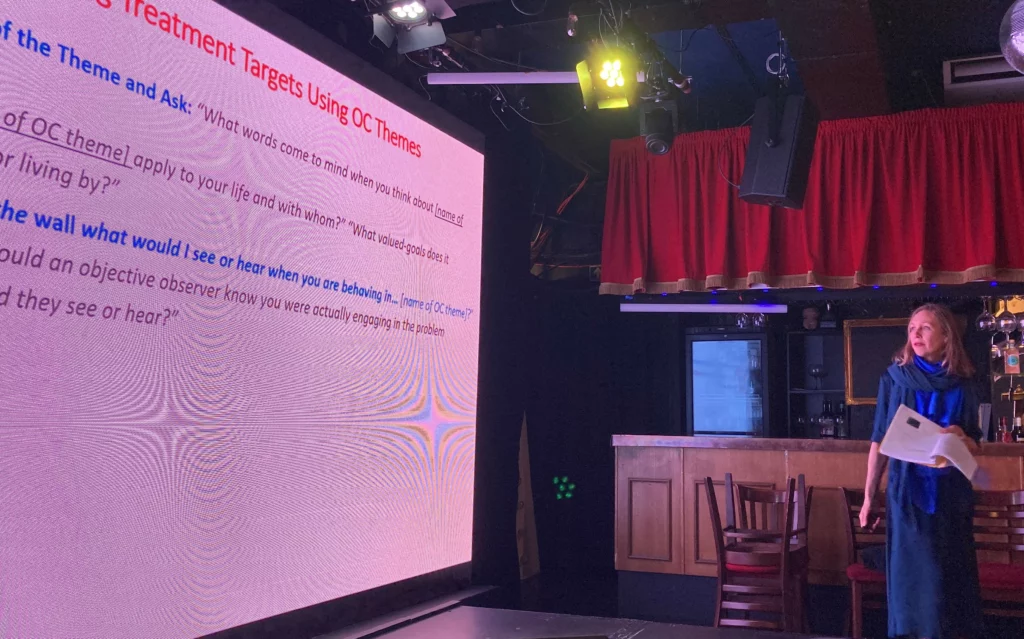What is it like to attend a Level 3 training course?

With the promise of unlimited tea and coffee, and a chance to loaf about in London for 3 days, I set off to attend level 3 of the RO-DBT blended learning course in January 2023. The level 2 RO-DBT course had significantly changed the way that I had practiced, but I still felt as though I needed support to deliver RO-DBT as a standalone treatment. Any hopes of loafing were soon dashed when I asked the trainer, Sophie, how she manages to speak for 3 days without getting a sore throat. “Don’t worry” she said, “you guys do most of the talking”. An ominous beginning.
Before long, we were tirelessly put to work. Raising eyebrows and then subsequently lowering them. Practicing, role playing, and using ever expanding, flamboyant gestures. We practiced everything in RO-DBT from the session scripts, to self-enquiry, chain analysis, and the notorious(ly fun) participation without planning exercises. Although we were given excellent feedback from the trainers, from early on, we were encouraged to give each other feedback on what could be strengthened in our practice. This helped us learn, experientially, a core lesson of RO-DBT – that honest feedback, accepted openly, increases social connection.

The training group became close over the 3 days, which meant that constructive feedback was frequently given, and that self-enquiry practices were authentic. Nowhere was this more evident than in day 2, when our resolve was tested as the previously thought unlimited tea and coffee had disappeared. At this, a posse of united UC and OC people had formed, simultaneously problem solving and assertively complaining (politely) to the staff, who were forced once again to place no restrictions on hot beverages.
I had probably always felt as though my attempts at teasing, improving social safety, and silliness were devastating to my clients. I had pictured them leaving sessions writing angry blogs and telling their friends in hushed tones about their awful therapist who behaved in dramatic, unusual, and unprofessional ways. “Your therapist pretends to be a chicken? What a fool”. Suffice to say, in level 3 I discovered, much to my surprise, that I was probably not having as much of an impact as I thought. I came into level 3 thinking that I probably needed to tone down my interventions but received the feedback that many of my social signals weren’t particularly obvious or overt. My chicken wings could have flapped a bit harder, apparently, or as it was put to me in feedback during level 3, “go bigger!”.
Although receiving feedback can bring us all closer to our edge, in this instance I felt like I was given permission to be authentic. In my social life I would be quite happy to be silly, spontaneous, and open, but I have worked in environments where that has been discouraged. Although the feedback I got was corrective, I felt validated that I could behave in a way that to me seemed more in line with my typical ‘non-therapy’ character.
This has translated directly into my practice. I feel more authentic, open, and spontaneous and less controlled and serious not just in RO, but in all of the modalities that I practice. Clients have responded strongly to me during recent sessions. Interestingly (or perhaps not to RO-DBT veterans) I found that when other people were less controlled in their signalling as therapists, I felt I understood their intervention better, felt more at ease, and had more fun in the therapy. Who would have thought that following the model would work as intended ay?
Most importantly, attending the level 3 course reminded me of why RO resonates so strongly with me. Over the course of 3 days I felt the principles of RO were embedded throughout. There was plenty of open direct feedback, spontaneity, social connection, and fun. I would wholeheartedly recommend anyone considering attending the level 3 course to take the plunge – even if initially you are just temped by the free tea and coffee.